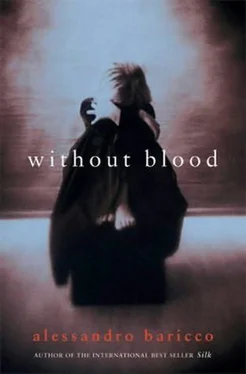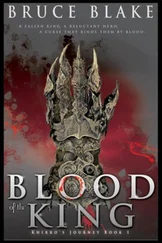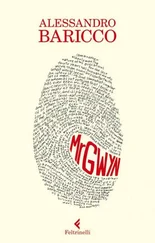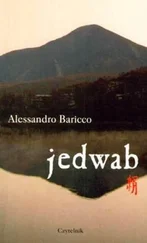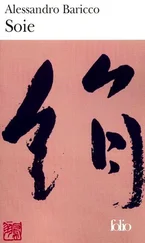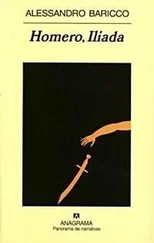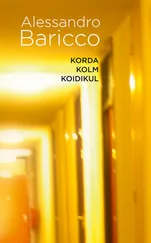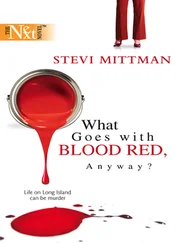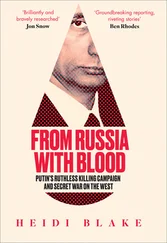When she began to undress she said, smiling:
“Don’t expect much.”
When he was lying on her, he said, smiling:
“You are very beautiful.”
From a room nearby came the sound of a radio, just perceptible. Lying on his back, in the big bed, completely naked, the man stared at the ceiling, wondering if it was weariness that made his head spin, or the wine. Beside him the woman was still, her eyes closed, turned toward him, her head on the pillow. They held each other by the hand. The man would have liked to hear her speak again, but he knew there was nothing more to say, and that any words would be ridiculous at that moment. So he was silent, letting sleep confuse his ideas, and bring back to him the dim memory of what had happened that evening.
The night outside was illegible, and the time in which it was vanishing was without measure. He thought that he should be grateful to the woman, because she had led him there by the hand, step by step, like a mother with a child.
She had done it wisely, and without haste. Now what remained to be done would not be difficult.
He held her hand, in his, and she returned his clasp. He would have liked to turn and look at her but then what he did was let go of her hand and roll onto his side, giving her his back. It seemed to him that it was what she was expecting from him. Something like a gesture that left her free to think, and in a certain way gave her some solitude in which to decide the final move. He felt that sleep was about to carry him off. It occurred to him that he didn’t like being naked because they would find him like that and everyone would look at him. But he didn’t dare tell the woman. So he turned his head toward her, not enough to see her, and said:
“I’d like you to know that my name is Pedro Cantos.”
The woman repeated it slowly.
“Pedro Cantos.”
The man said:
“Yes.”
Then he laid his head on the pillow again and closed his eyes.
Nina continued to repeat the name in her mind. Without corners, it slid away, like a glass marble. On an inclined tray.
She turned to look at her purse, sitting on a chair, near the door. She thought of going to get it, but she didn’t, and remained lying on the bed. She thought of the ticket kiosk, of the waiter in the café, of the taxi with the plastic-covered seats. She saw again Pedro Cantos weeping, his hands sunk in the pockets of his overcoat. She saw him as he caressed her, without the courage to breathe. I will never forget this day, she said to herself.
Then she turned, moved closer to Pedro Cantos, and did what she had lived for. She curled up behind him: she pulled her knees up to her chest; aligned her feet until she felt her legs perfectly paired, the two thighs softly joined, the knees like two cups balanced one on the other, the calves separated by nothing; she shrugged her shoulders slightly and slid her hands, joined, between her legs. She looked at herself. She saw an old doll. She smiled. Animal and shell.
Then she thought that however incomprehensible life is, probably we move through it with the single desire to return to the hell that created us, to live beside whoever, once, saved us from the inferno. She tried to ask herself where that absurd faithfulness to horror came from but found that she had no answers. She understood only that nothing is stronger than the instinct to return, to where they broke us, and to replicate that moment forever. Only thinking that the one who saved us once can do it forever.
In a long hell identical to the one from which we came.
But suddenly merciful. And without blood.
The sign outside said its rosary of red lights. They were like the flames of a house on fire.
Nina rested her forehead against Pedro Cantos’s back.
She closed her eyes and slept.
Alessandro Baricco was born in Turin in 1958 and still makes his home there. The author of four previous novels, he has won the Prix Médicis Étranger in France and the Selezione Campiello, Viareggio, and Palazzo al Bosco prizes in Italy.
ALSO BY ALESSANDRO BARICCO
An Iliad
City
Silk
Ocean Sea
VINTAGE INTERNATIONAL
Vintage Books
A Division of Random House, Inc.
New York
FIRST VINTAGE INTERNATIONAL EDITION, MARCH 2008
Translation copyright © 2004 by Alessandro Baricco
All rights reserved. Published in the United States by Vintage Books, a division of Random House, Inc., New York. Originally published in Italy as Senza sangue by Rizzoli, Milan, in 2002. Copyright © 2002
RCS Libri S.p.A., Milano. This translation originally published in hardcover in the United States by Alfred A. Knopf, a division of Random House, Inc., New York, in 2004.
This is a work of fiction. Names, characters, places, and incidents either are the product of the author’s imagination or are used fictitiously. Any resemblance to actual persons, living or dead, events, or locales is entirely coincidental.
Vintage is a registered trademark and Vintage International and Colophon are trademarks of Random House, Inc.
The Library of Congress has cataloged the Knopf edition as follows: Baricco, Alessandro [date]
[Senza sangue. English]
Without blood / Alessandro Baricco ; translated from the Italian by Ann Goldstein—1st American ed.
p. cm.
I. Goldstein, Ann, 1949– . II. Title.
PQ4862.A6745S4513 2004 853’.914—dc22 2003058917
eISBN: 978-0-307-38936-7
Book design by Johanna Roebas
www.vintagebooks.com
v1.0
The events and persons mentioned in this story are imagi-nary. The frequent choice of Spanish names is due purely to their music and is not intended to suggest a historic or geographical location of the action.
